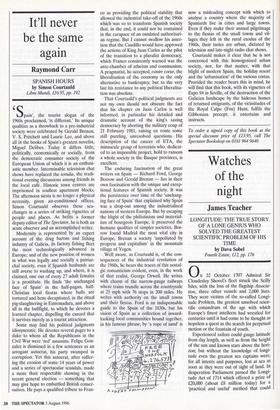It'll never be the same again
Raymond Carr
SPANISH HOURS by Simon Courtauld
Libra Mundi, £16.95, pp. 192
`S pain', the tourist slogan of the 1960s proclaimed, 'is different.' Its unique qualities as a throwback to a pre-industrial society were celebrated by Gerald Brenan, V. S. Pritchett and Laurie Lee, and above all in the books of Spain's greatest novelist, Miguel Delibes. Today it differs little, politically, economically or socially, from the democratic consumer society of the European Union of which it is an enthusi- astic member. Interminable television chat shows have replaced the tenulia, the tradi- tional evening discussions among friends in the local café. Historic town centres are imprisoned in soulless apartment blocks. The afternoon siesta is no longer a physical necessity, given air-conditioned offices. Simon Courtauld observes these sea- changes in a series of striking vignettes of people and places. As befits a former deputy editor of The Spectator, he is both an acute observer and an accomplished writer. Modernity is represented by an expert account of the drug barons and fishing industry of Galicia, its factory fishing fleet the most technologically advanced in Europe; and of the new position of women in what was legally and socially a patriar- chal society, even if Spanish husbands are still averse to washing up, and where, it is claimed, one out of every 27 adult females is a prostitute. He finds 'the unchanged face of Spain' in the half-pagan, half- Christian local fiestas where bulls are tortured and hens decapitated, in the ritual pig-slaughtering in Estremadura, and above all in the bullfight, to which he devotes a learned chapter, dispelling the canard that it survives merely as a tourist attraction. Some may find his political judgments idiosyncratic. He devotes several pages to a duke to whom all the Republicans in the Civil War were 'red' assassins. Felipe Gon- zalez is dismissed in a few sentences as an arrogant autocrat, his party swamped in corruption. Yet this autocrat, after suffer- ing the erosion of some 14 years of power and a series of spectacular scandals, made a more than respectable showing in the recent general election — something that may give hope to embattled British conser- vatives. He pays a qualified tribute to Fran- co as providing the political stability that allowed the industrial take-off of the 1960s which was so to transform Spanish society that, in the end, it could not be contained in the carapace of an outdated authoritari- an regime. But I cannot swallow his asser- tion that the Caudillo would have approved the actions of King Juan Carlos as the pilot of the transition to a pluralist democracy, which Franco consistently warned was the ante-chamber of atheism and communism. A pragmatist, he accepted, contre coeur, the liberalisation of the economy as the only alternative to bankruptcy; but to the very last his resistance to any political liberalisa- tion was absolute.
That Courtauld's political judgments are not my own should not obscure the fact that his chapter on Juan Carlos is well informed, in particular his detailed and dramatic account of the king's saving democracy by aborting the military coup of 21 February 1981, raising en route some still puzzling, unresolved questions. His description of the cancer of ETA, the minuscule group of terrorists who, dedicat- ed to an impossible project, hold to ransom a whole society in the Basque provinces, is excellent.
The enduring fascination of the great writers on Spain — Richard Ford, George Borrow and Gerald Brenan — lies in their own fascination with the unique and excep- tional features of Spanish society. It was the persistence over time of the 'unchang- ing face of Spain' that explained why Spain was a drop-out among the industrialised nations of western Europe. But by escaping the blight of the philistinism and material- ism of bourgeois Europe, it preserved the humane qualities of simpler societies. Bor- row found Madrid the most vital city in Europe, Brenan a society 'unpolluted by progress and capitalism' in the mountain village of Yegen.
Well aware, as Courtauld is, of the con- sequences of the industrial revolution of the 1960s, he bears the traces of this nostal- gic romanticism evident, even, in the work of that realist, George Orwell. He writes with charm of the narrow-gauge railways where trains trundle across the countryside at 25 mph with 76 stops in 200 miles. He writes with authority on the small towns and their fiestas. Ford is an indispensable guide to the Spain of the 1830s, but his vision of Spain as a collection of inward- looking local communities bound together, in his famous phrase, by 'a rope of sand' is now a misleading concept with which to analyse a country where the majority of Spaniards live in cities and large towns. Even if they make their annual pilgrimage to the fiestas of the small towns and vil- lages they left in the rural exodus of the 1960s, their tastes are urban, dictated by television and late-night radio chat shows.
Courtauld makes it clear that he is not concerned with this homogenised urban society, nor, for that matter, with that blight of modern Spain, the holiday resort and the 'urbanisation' of the various costas. Provided the reader bears this in mind, he will find that this book, with its vignettes of Expo 94 in Seville, of the destruction of the Galician landscape by the hideous homes of returned emigrants, of the vicissitudes of the Royal Calpe (Fox) Hunt, fulfils the Gibbonian precept: it entertains and instructs.
To order a signed copy of this book at the special discount price of £13.95, call The Spectator Bookshop on 0181 964 9640.


















































 Previous page
Previous page